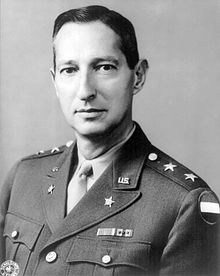Mark Wayne Clark
| Mark W. Clark | |
|---|---|
 |
|
| Nickname(s) | "Wayne", "Contraband" (while at West Point) |
| Born |
May 1, 1896 Madison Barracks, Sackets Harbor, New York, U.S. |
| Died | April 17, 1984 (aged 87) Charleston, South Carolina, U.S. |
| Buried at | The Citadel, Charleston, South Carolina, U.S. |
| Allegiance |
|
| Service/branch |
|
| Years of service | 1917–1953 |
| Rank |
|
| Unit |
|
| Commands held | 3rd Battalion, 11th Infantry Regiment II Corps Fifth Army Seventh Army 15th Army Group Sixth Army United Nations Command (Korea) |
| Battles/wars |
World War I World War II Korean War |
| Awards |
Distinguished Service Cross Army Distinguished Service Medal Navy Distinguished Service Medal |
| Spouse(s) | Maurine Doran (m. 1924–1966; her death; 2 children) |
| Other work | The Citadel, President |
Mark Wayne Clark (May 1, 1896 – April 17, 1984) was a United States Army officer who saw service during World War I, World War II, and the Korean War. He was the youngest lieutenant general (three-star general) in the United States Army during World War II.
During World War I, he was a company commander and served in France in 1918, as a 22-year old captain, where he was seriously wounded by shrapnel. After the war, the future U.S. Army Chief of Staff, General George Marshall, noticed Clark’s abilities. During World War II, he commanded the United States Fifth Army, and later the 15th Army Group, in the Italian campaign. He is known for leading the Fifth Army in its capture of Rome in June 1944.
Clark has been heavily criticized for ignoring the orders of his superior officer, British General Sir Harold R. L. G. Alexander, and allowing the German 10th Army to slip away, in his drive to take Rome, the capital of Italy, a strategically unimportant city. The German 10th Army then joined with the rest of the German army group at the Trasimene Line. In March 1945, Clark, at the age of 48, became the youngest American officer ever to be promoted to the full rank of four star general.
...
Wikipedia
